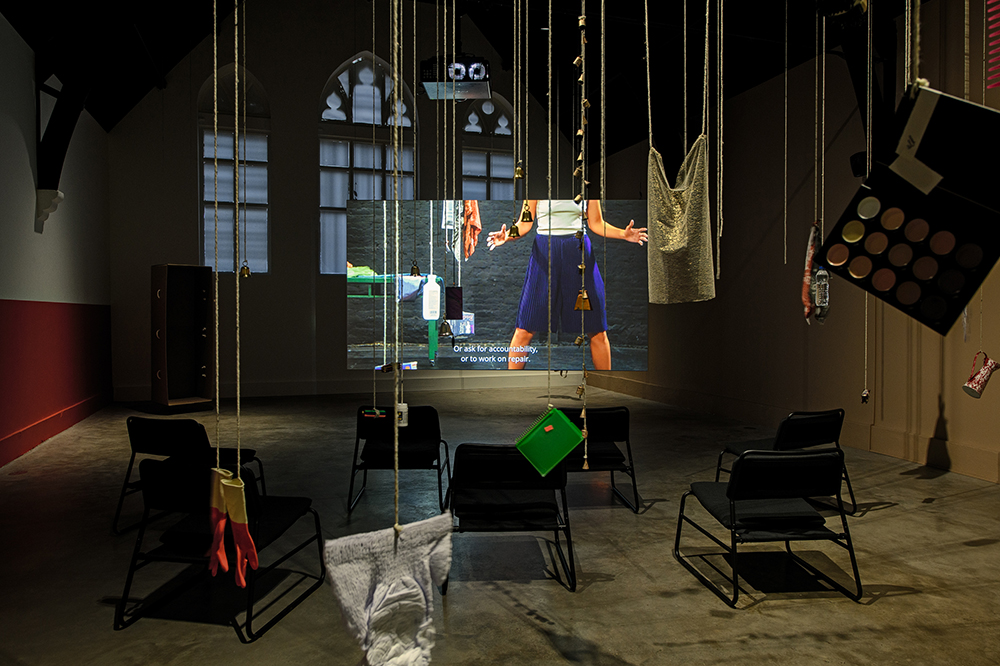
In rethinking life and death ecologies, the role of the ‘death doula’—a companion to support people through this difficult transition and their grieving loved ones—provides an alternative vocabulary with which to reorient our approach to late stage aid. It is a practice that encourages us to turn towards what we try so hard to avoid and hide, in a culture in which the sick and those in need of care are incongruous with a capitalist focus on productivity and individualism. Doula-client relationships engage with the difficult and complex emotions of loss and bereavement while navigating the signs and symptoms of mortality. Burial, ceremony, rites and memorials play vital roles here, “creating a ritual where there hasn’t been one,” in the words of artist Every Ocean Hughes. This field critically investigates and challenges the conventions, assumptions, expectations, and supposed truths installed by our current political economy’s framings of passing away and mourning those lost.
In place of the simple dichotomies of a “good death” versus a “bad death,” Hughes’ recent exhibition, One Big Bag at Studio Voltaire complicates dominant understandings of palliative care by interrogating the ways in which normative thinking around maturation often shape contemporary discourses on death, dying, and mourning. One Big Bag focuses on a millennial death doula (performed by Lindsay Rico) and the items in her ‘mobile corpse kit.’ As a non-medical professional, a doula provides physical, emotional and informational support before, during and after birth or at life’s cessation. Hughes’ immersive film installation asks practical, political and poetic questions contributing to a necessary and growing debate around end-of-life practices.
The central part of the exhibition consists of a large suspended screen showing a death doula’s forty-minute monologue-performance, choreographed by Miguel Gutiérrez. Through intense eye contact, repeated actions and physical movements, this doula emphasises the importance of holding loved ones in memory on “this alive side”. She performs a riveting series of gestural movements, forming an expressive dance sequence that is both physically gruelling and emotionally charged. Rico slams her outstretched legs flat on the floor beneath, pounds her fists on her chest, and marches around the space. Casually dressed in loose blue shorts and a grey athletic top, we learn why she became a death doula. A quick jolted rhythm is the score that Rico follows, passionately stressing the need to listen carefully to build alternative models of mutual aid.
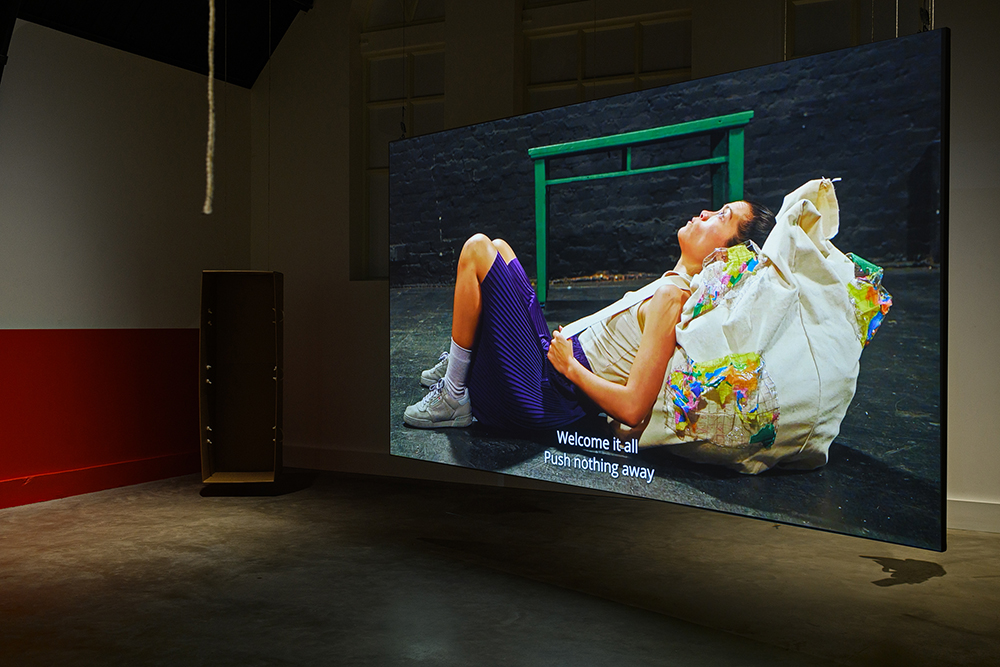
Looking around the installation space, the many transitions that queer people go through springs to mind. The paths taken, the names changed, and the expectations shed in learning about and uncovering oneself. The space at Studio Voltaire resembles a small room in a hospital or hospice centre, or perhaps a dark medical office. Hughes’ colour selection undoubtedly calls to mind the institutional décor often attributed to spaces where death traditionally occurs. Painted for the exhibition, one wall is a shade of brown, the other, a cold and impersonal white. The remaining sides are two-tone; the bottom of one is a bright strip of blood-red, the other an intense pure green, and both upper halves are white. These sterile hues usually run through a hospital’s corridors as a wayfinding device to help patients reach a specific ward or lab. A stark separation between the floor and the wall—like the one here—helps those with aging eyes to distinguish between different planes and reduces mobility issues. Guided by these lines of pigment, one can map out the path around the doula’s maze of hanging objects. This winding labyrinth awakens memories of residential care facilities where loved ones live. Though some may have found Hughes’ ability to reconstruct this claustrophobic and clinical medical care facility uncomfortable, one is made grateful for the artist’s ability to bring and hold death closer. As musician and novelist Jenny Hval sings in ‘American Coffee’, “what is a home but a place you’ll be dying.”
Leading viewers into the largely undiscussed field of ‘corpse care’, the video’s narration oscillates from storytelling to anecdotal commentary, including factual descriptions of every procedure the doula performs, such as emptying remaining fluids from the body and cleaning it with soap. Hughes’ doula describes which commercially-available glue is best for reconnecting flesh after an autopsy, her preferred gloves for handling the cadaver and its secretions, as well as how to keep the newly-dead cool with ice, and so on. In the film, these tools hang from a ceiling and correspond with the height of the part of the deceased where one would use them. At the end of the performance, the doula cuts these materials down and places them in one comically-large canvas bag, a ritual action with everyday items manipulated for different use.
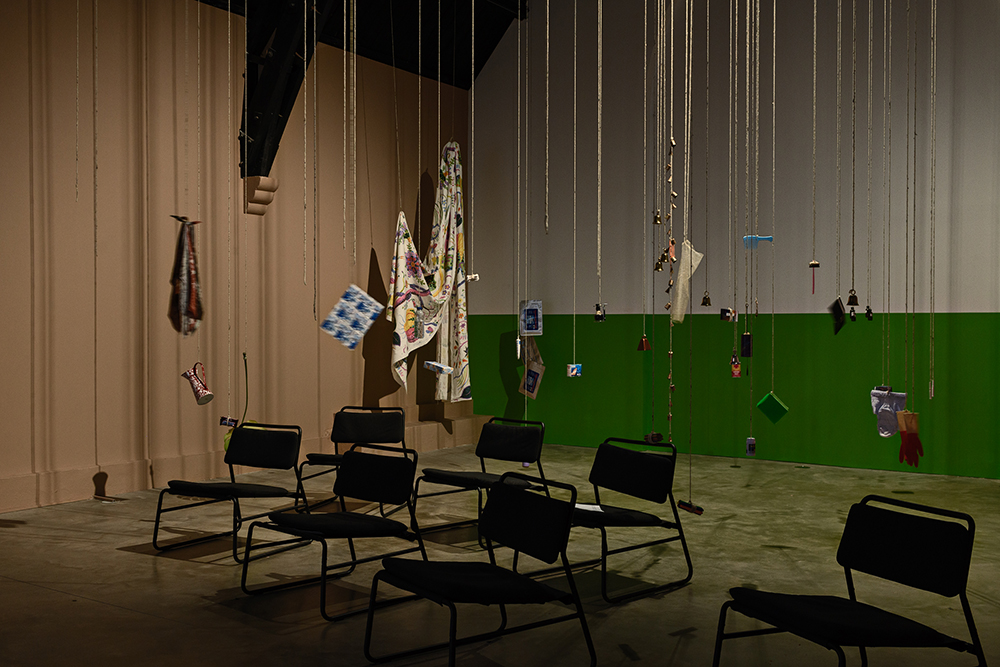
Mirrored in the installation, the objects that constitute the corpse care kit appear as mobile structures. Stage makeup, scented oils, combs, tampons for blocking the anus, bandages, diapers, thick gloves, ceremonial bells, perineal spray, and glue hang on twine from the gallery’s ceiling. In the corner, an open cardboard casket stands upright with intense physicality.
In a time where death has become deeply medicalised, occurring often in hospitals and nursing homes, consciously hidden from everyday life, Hughes’ One Big Bag provides a tender and sometimes cheeky antidote for the wider inequalities of the death industry. These include but are not limited to the economic burden of funerals and end-of-life care, racism in medical institutions and funeral practices, and the bureaucratic barriers which affect queer communities and limit agency in death. Hughes encourages us to think again, and differently, about living through and being recognised by neoliberal capitalism.
Scholar and cultural theorist Lauren Berlant discusses this relationship between the entangled economic and political systems of private ownership, life and dying with a term she calls ‘slow death.’ Building on Michel Foucault’s notions on how political power determines who gets to live, Berlant explains that slow death is the “physical wearing out of a population and the deterioration of people in that population that is very nearly a defining condition of their experience and historical existence.” We are, she suggests, exhausted by neoliberal capitalism; we are all in a slow death, but for some, this is more apparent. In this system, competition is the defining characteristic of all human relations. Citizens are redefined as consumers, whose choices are best exercised by buying and selling, a structural process that rewards merit, upholds value judgments, and punishes inefficiency. It is no coincidence that those who experience life in relation to systemic conditions of deathliness are the poor and working-class, for they are capitalism’s victims and its sustaining force. Take, for instance, the culture and class war on social care in the UK today, which affects everything from everyday life and healthcare to housing. Grossly underfunded and overworked staff are only able to do the bare minimum due to constraints of the job, leaving those with assistance needs they can’t afford to rely on a system that repeatedly fails them. As Berlant implies, someone who is sick, dying, dependent and in need of state care is not a productive individual or source of labour, and therefore left behind.
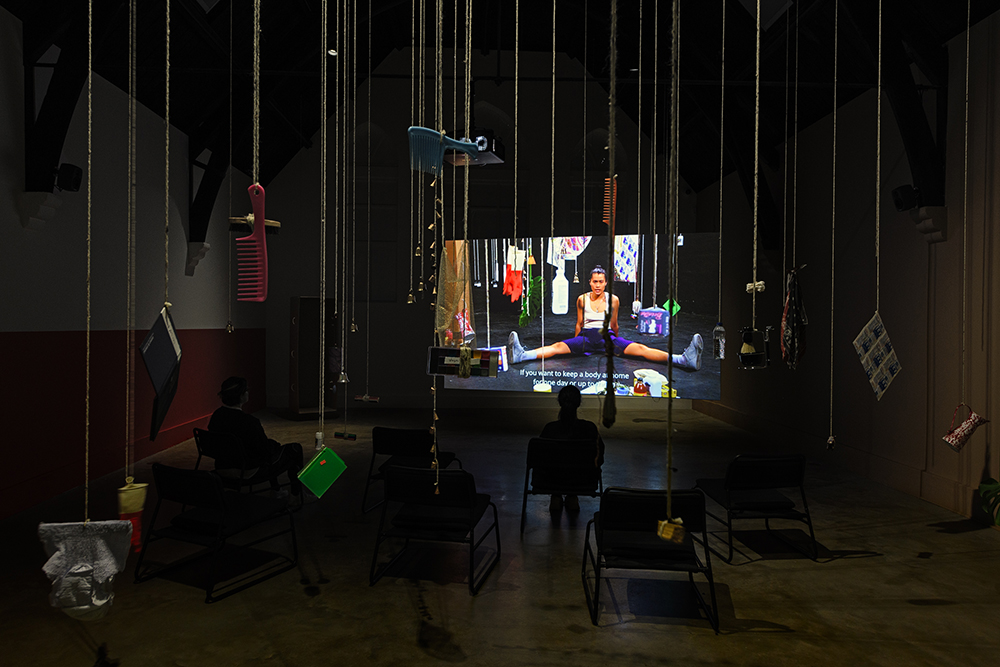
Berlant provides a practical, theoretical framework for understanding how present-day economic policies drain social resources and further marginalise precarious populations. As capitalism produces slow deaths, Berlant equally suggests that in thinking about this phenomena, we are lead to question the very terms that define what it means to have a life, to live. By making space for slow death and accepting that it is part of living under oppressive political and economic systems, we can understand how health—or lack thereof—is a construct of capitalism.
By making visible the realities of end-of-life care, One Big Bag invites us to reflect more widely on how This power can take the form of actual control over biological existence or that of social death, be it via exile or violent and systematic exclusion from opportunity. Queer communities are familiar with this exclusion, grouped to meanings of agency and personhood imposed upon us by unforgiving systems and the rise in anti-gay and transphobic legislation. We need only look to the AIDS crisis to see an entire generation unfairly condemned to a slow death by the neglectful politicised response to the epidemic, creating a lasting stigma. The film installation acts as a necessary extension of queer understandings of death and dying. Where themes of survival, diverse kinship, and accountability are not limited to individual subjects and bodies, but rather engulf whole populations consigned as dispensable by the hetero-imaginary.
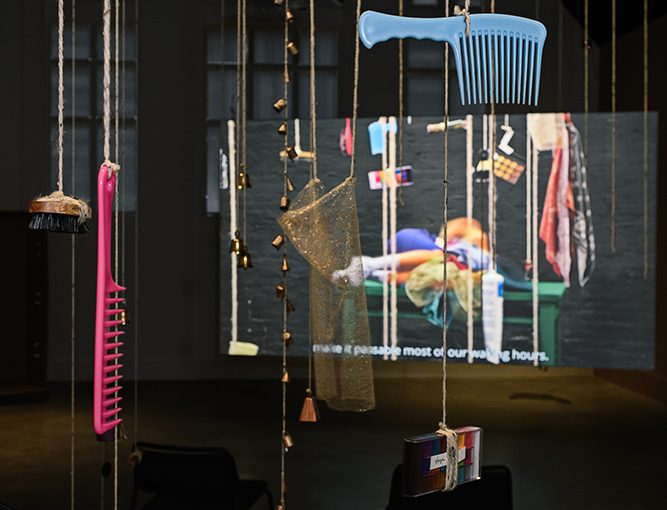
Set against this political backdrop, end-of-life care for Hughes’ death doula is absorbed increasingly into hegemonic apparatuses, in ways that misrepresent death for those unassimilable into capitalist and colonial regimes, and who are thus deemed disposable. Consider how, in the case of queer death, a family that has been absent from a person’s life often stakes their claim once that person has died, shutting out those who have embraced, loved, supported and shared in the deceased’s life. Hughes’ doula describes how she navigates the death industry—the filling out of forms, ensuring that the deceased’s wishes are met with care, and intervening with relatives if necessary. Part of her job is to protect the dead’s wishes, making sure they are honoured and that, as One Big Bag’s doula explains, their “chosen family are recognised,” or to “hold them in love”. Community is essential, and this is a familiar and shared experience for LGBTQIA2++ people.
Matters of life and death have always been part of the human experience. In rethinking mortality in all its ontological, ethical and political terms, Hughes refuses to perpetuate the epistemological and symbolic violence of dismissing some deaths as not worthy enough, or not grievable enough. Instead, One Big Bag continuously reifies and recentres all types of mortality by demystifying its boundaries. Accounting for different care settings at the end of life, it celebrates the autonomous rights of moribound subjects as the foundations of the death doula role.**
Kat Benedict is a mad trans queer anti-disciplinary artist. Every Ocean Hughes’ One Big Bag was on at Studio Voltaire, London, running January 28 to April 24, 2022.













